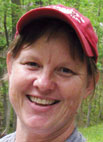 Glenn and Mary Jane Phifer, and their daughter, Savannah, live on an 82-acre farm in Douglas County near Mansfield, Mo. They moved to this farm after living for 20 years in the east. Glenn retired from the Art Department of Appalachian State University. They have been married for 25 years.
Glenn and Mary Jane Phifer, and their daughter, Savannah, live on an 82-acre farm in Douglas County near Mansfield, Mo. They moved to this farm after living for 20 years in the east. Glenn retired from the Art Department of Appalachian State University. They have been married for 25 years.
With the dream of living on a secluded retirement farm, the family joked that they just threw a dart at the atlas. There was a little more to it than that, but Mary Jane Phifer said, “We really like the Mansfield area.” They have lived there for 5 years.
Because they needed to have some brush cleared, Mary Jane said, “We got our first Valera Spanish goats and just loved them. It snowballed from there.”
The Phifers have two lines of Spanish goats, Valera and Pape. Mary Jane said, “Spanish goats are a rare breed and the Valera are very rare.”
They now have 65 goats. Some are meat goats and others are milking goats. Mary Jane milks the goats once a day. “I put the babies in a pen at night and then I milk the mommas in the morning. I let the babies run with the mommas all day.”
She works one day a week at a clinic in Rolla. On that day, Savannah helps with the milking of five goats. Mary Jane only uses the milk to make cheese.
All the goats have basically the same diet, except the milking goats “get cattle cubes to keep them quiet on the milking stands,” she said.
The Phifers rotate the goats in the woods and in the fields with their cattle. Mary Jane said the greatest advantage to having goats is “they keep your land trimmed and they clear your woods. They also improve the pastures for the cattle. No buck brush, no wild roses and no wild raspberries. We do management intensive grazing. We do strip grazing with the cattle and the goats.”
She likes the Spanish goats because “they are hardier and more parasite resistant than other breeds. We only have to worm them maybe twice a year; after they kid and again in late summer.”
When it comes to the meat goats, Mary Jane sells replacement breeding stock and said, “Every year I sell out.”
She said they eat goat meat and explained its benefits. “It’s very nutritious, low in fat, high in Omega 3’s, and free of antibiotics and added hormones.”
The biggest problem Mary Jane has found with goats is “trees falling on the fences and the goats spreading out. If we can’t call them up, we check the fences, and we call them up about every day.”
Her best advice for someone wanting to start a goat herd is, “Get your fences put up first, woven wire. Buy from a breeder, not the sale barn. People sell their problems at the sale barn.”
Besides the goats, the Phifers also have 13 cow/calf pairs of Irish Dexter cattle, which they choose for their size. Mary Jane explained, “We didn’t want big cattle.” It is the only breed they have owned.







